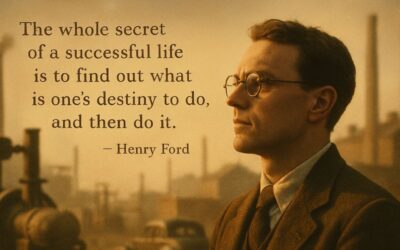At some point in life, we’ve all felt stuck—whether in a job, a relationship, or a personal routine that no longer serves us. It’s easy to fall into familiar patterns, hoping things will magically improve, but that’s rarely how life works. The quote “If you do what you always did, you will get what you always got” is a reminder that change is essential for growth. In this post, we’ll dive into the meaning of this thought-provoking statement, explore how it applies to different areas of life, and offer practical ways to embrace change.
The Meaning Behind the Quote
This quote points to the idea that repeating the same actions will inevitably lead to the same outcomes. It challenges us to step back and ask, “Am I doing the same thing over and over but expecting different results?” Whether it’s a personal habit, a work strategy, or the way we approach relationships, this quote reminds us that growth requires change. If we want new outcomes, we need new approaches.
Breaking Free from Comfort Zones
One of the biggest reasons people struggle to change is the lure of the comfort zone. It feels safe to stick with what you know, even if it’s not giving you the results you want. Think about it—have you ever kept doing the same workout routine but stopped seeing progress? Or stuck with a job you didn’t like, hoping things would improve without changing your approach? It’s easy to cling to old habits because they’re familiar, but comfort zones can quickly turn into ruts.
Applying the Quote to Personal Growth
Personal growth is one of the most obvious areas where this quote applies. If you’ve been waiting for things to improve without making any changes, it’s time to rethink your approach. Want to get healthier? You might need to change your diet or try a new fitness routine. Hoping to learn a new skill? Sticking to the same old routine won’t get you there—taking a course or challenging yourself with new experiences will. Growth doesn’t happen by accident—it’s intentional and often requires stepping into the unknown.
How the Quote Applies to Relationships
Relationships, whether romantic, platonic, or professional, also benefit from this lesson. If communication patterns in a relationship aren’t working, repeating the same conversations won’t solve the problem. Maybe it’s time to try a different approach—listen more, express yourself differently, or even seek advice from someone outside the situation. Growth in relationships requires flexibility and a willingness to change old habits.
Embracing Change in the Workplace
In the workplace, this quote is especially relevant. If you’ve been following the same strategy and it’s not delivering the results you want, it’s time to rethink your approach. It’s easy to get stuck in routines, but innovation and growth require experimentation. Whether you’re trying to get a promotion, increase productivity, or make a project succeed, doing something different can lead to breakthroughs. Change might involve learning new skills, seeking feedback, or collaborating with different people.
Overcoming Fear of Change
Let’s be real—change isn’t easy. The fear of failure or uncertainty can make it tempting to stick with the familiar, even when it’s not working. But this quote reminds us that doing the same thing guarantees the same results. The real risk lies in not changing at all. Small, manageable changes are a great way to start. Even shifting your mindset from “I’ve always done it this way” to “What if I try something new?” can make a difference.
The Power of Experimenting with New Approaches
Life isn’t a one-size-fits-all journey, and this quote encourages us to experiment with new approaches until we find what works. If one thing doesn’t work, try something else. It’s a bit like adjusting a recipe—if the dish doesn’t taste right the first time, you tweak the ingredients. The same principle applies to life. Trying new things opens the door to unexpected opportunities and growth, even if the results aren’t immediate.
“If you do what you always did, you will get what you always got” is more than just a catchy quote—it’s a powerful reminder that change is necessary for growth. Whether it’s in personal development, relationships, or the workplace, repeating the same actions will only lead to the same outcomes. Embracing change can be uncomfortable, but it’s often the only way to move forward. So, the next time you find yourself stuck, ask yourself—what new approach can I try today? The possibilities are endless, but it all starts with that first step toward something different.
Let’s Talk
You know, the more I think about it, the more this quote really hits home: “If you do what you always did, you will get what you always got.” It sounds so simple, almost obvious, right? But then, why is it so hard to actually live by it? We all fall into patterns, clinging to what feels comfortable, even when we know deep down that it’s not getting us anywhere. It’s like ordering the same thing from your favorite restaurant every time, hoping one day it magically tastes better. Spoiler: it won’t.
And let’s be real—change is hard. It’s messy, uncomfortable, and there’s no guarantee it’ll work out the way we want. But the funny thing is, doing nothing feels just as frustrating. Ever been in one of those cycles where you know what you’re doing isn’t working, but you still keep doing it anyway? It’s like banging your head against the wall, expecting it’ll stop hurting if you just bang a little harder. Whether it’s a workout routine, a job that’s draining the life out of you, or even an argument you keep having with someone—doing the same thing over and over just keeps you stuck. So why do we do it? Maybe because it’s easier to stick with what’s familiar than to take a chance on something new.
The tricky part is recognizing when we’re stuck. It’s not always obvious. Sometimes we convince ourselves we’re making progress when all we’re really doing is running in place. Have you ever told yourself, “If I just try harder, things will change”? Yeah, me too. But trying harder at the same thing doesn’t always lead to progress—it just leads to exhaustion. What if, instead of trying harder, we tried differently? That’s the part people don’t talk about enough. Changing the approach, even in small ways, can make all the difference.
This idea applies to so many areas of life. Take relationships, for example. If a friendship or a relationship feels stuck, maybe it’s not about doing more of the same things but about having different conversations. Instead of the same old arguments or small talk, what if you tried being more vulnerable or really listening in a way you haven’t before? Sometimes, shifting the conversation just a little can open doors you didn’t even know were there.
It’s the same with personal goals. How many times have we set the same New Year’s resolutions, only to abandon them by February? It’s not because we’re lazy—it’s because we often approach them the same way every time. Maybe the goal isn’t the problem—it’s the strategy. If going to the gym hasn’t worked for you, what if you tried a dance class or a hike instead? If reading a book feels like a chore, what about switching to audiobooks? The magic lies in trying something new.
And here’s the thing—small changes can have a huge impact. You don’t need to overhaul your whole life to see different results. Sometimes, the smallest shifts create the biggest ripples. Maybe it’s setting a boundary at work you’ve never dared to set before. Maybe it’s saying yes to something you’d normally say no to. Or maybe it’s finally saying no to something you’ve been doing just because you’ve always done it. Every small change is like planting a seed. You won’t see the results immediately, but over time, those seeds grow into something new.
It’s funny how we expect change to be this grand, dramatic thing, but often, it sneaks up on us in tiny ways. Have you ever looked back at a situation and thought, “Wow, I didn’t even realize I was growing through that”? That’s the beauty of trying new approaches—it gives you space to grow without even realizing it.
So, what about you? Is there something in your life that feels stuck right now? And what’s one small thing you could do differently today to shake things up? Maybe it’s trying a new way of solving a problem, or maybe it’s as simple as changing your morning routine. Whatever it is, remember: if you do what you always did, you’ll get what you always got. But if you do something new, who knows where it could lead?
Let’s Learn Vocabulary in Context
Let’s explore some of the interesting words and phrases from the topic and see how they fit into everyday life. First up, “stuck.” It’s such a simple word, but it captures that feeling of being trapped, whether it’s in a situation or a mindset. You might say, “I feel stuck in this job,” when you’ve been doing the same thing for too long with no sense of progress. Being stuck isn’t just about where you are physically—it’s also mental, like when you keep having the same thoughts without finding a solution.
Next, we have “comfort zone.” This one came up a lot because staying in your comfort zone feels safe, but it’s also where growth tends to stall. You might hear someone say, “I need to step out of my comfort zone,” when they’re trying something unfamiliar, like public speaking or learning a new skill. It’s that space where things feel easy but eventually become too predictable.
“Patterns” are another key idea. In this context, we talked about how repeating the same patterns keeps us in the same place. It’s not just about habits—it can also refer to the way we approach problems. If you’ve ever thought, “Why do I always end up in the same type of relationship?” that’s noticing a pattern. The key is recognizing it and deciding to try something new.
Then there’s “approach.” This word is useful because it’s not just about physical movement—it’s about how you tackle a task or problem. If your usual approach isn’t working, it’s time to switch things up. For example, “I need to change my approach to studying,” means trying a different strategy, like studying with a friend instead of going solo.
“Breakthrough” came up when we talked about trying new things. A breakthrough is that “aha” moment when something finally clicks, usually after a lot of effort. It’s not always dramatic—sometimes it’s just realizing a small thing that changes everything. You might say, “I had a breakthrough with my workout routine—I finally found an exercise I enjoy.”
We also mentioned “intentional.” This is a great word to describe making conscious choices. Living intentionally means thinking carefully about your actions instead of just going through the motions. For example, “I’ve started being intentional about how I spend my weekends” suggests that you’re planning your time with purpose instead of letting it slip away.
“Mindset” is another key term. It refers to the way we think and perceive the world. If you have a fixed mindset, you believe things are set in stone, while a growth mindset means you believe things can improve with effort. Switching your mindset is often the first step toward making real change.
We also talked about “boundaries.” This word is important because setting boundaries shows self-respect. It means knowing when to say no and protecting your time and energy. You might say, “I’ve set boundaries around work emails—I don’t check them after 6 PM.” Boundaries aren’t just for relationships—they apply to all areas of life.
Let’s not forget “small changes.” This phrase reminds us that change doesn’t have to be huge to be meaningful. Small changes add up over time, like adjusting your sleep schedule by 15 minutes each day until you reach your goal. It’s a reminder that even the smallest steps matter.
And finally, we have “routine.” Routines can be helpful, but when they become too rigid, they can make us feel stuck. Switching up your routine, even slightly, can introduce some much-needed variety. You might say, “I changed my morning routine by going for a walk, and it made a big difference.”
To wrap things up, here are a couple of questions to think about: What’s one routine or pattern you feel stuck in right now? And what’s one small change you could make today to shift things in a new direction?










0 Comments